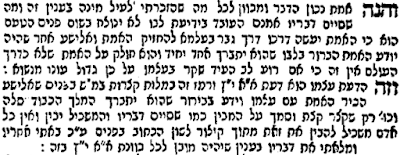Thursday, December 24, 2015
Omri's daugher married Yehoshaphat or Yehoram?
Thursday, October 29, 2015
Tuesday, October 27, 2015
Monday, October 26, 2015
When in Rome...?
Midrash B'Reshis Rabah 48:16: "When you come to a city, behave according to the local etiquette. [From where do we learn this?] Since there is no eating and drinking in heaven, when Moshe went up to heaven [to retrieve the Torah], he did not eat, as it says... 'I did not eat bread nor did I drink water' (Deut. 9:9). But below (on earth), where there is eating and drinking, [it says,] 'And [Avraham] stood over [the angels] under the tree and they ate.'
Friday, October 16, 2015
Thursday, October 15, 2015
Fear of God more valuable than Torah study
Tuesday, October 13, 2015
Monday, August 31, 2015
Wednesday, August 19, 2015
Bringing Children to Synagogue on Rosh haHashanah
Tuesday, August 11, 2015
Was the Civil War about Slavery?
There continues to be much debate over whether the Civil War was fought OVER slavery, or whether slavery was merely a side-issue.
Currently reading Judaism and its History by Abraham Geiger, a book published in Europe contemporaneously with the American Civil War, in which Geiger, a German Jew, writes:
"[For Jews, the] question [of slavery] was settled thousands of years ago, [a question] that in our day marks its bloody traces upon a whole continent, and rends it to pieces..."
Sounds like even in its time it was understood even among European nations that the Civil War centered around slavery. Yet a few lines later, Geiger writes:
"The struggle which has burst forth has nothing whatever to do with the nature of slavery, whether or not it should be permitted to exist; it is true, one section has repudiated it for itself, but has hitherto found it altogether right to preserve it as a constitutional institution in the other."
Sounds like slavery was NOT the central issue of the Civil War, if an issue at all. Don't these two statements (in the same paragraph!) appear contradictory?
I'm not certain, but I think the synthesis is that Geiger makes the point that while the war was fought over whether slavery was to continue as a reality in the United States at all, this was for economic or social but not moral reasons. If it was morally abhorred, Geiger points out that the states that allowed it would never have tolerated it elsewhere. The original divide of slave versus non-slave states was an economic one, not a moral one. Lincoln merely opined that the country must be all one way or all the other, and the South went to war to keep their slaves. That does not mean that the Union was morally opposed to slavery, or that that moral opposition was at the heart of the conflict.
Not sure, what are your thoughts?

















